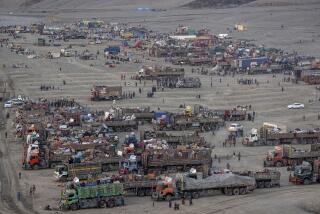Kabul’s Fall Stirs Anxiety in Pakistan
- Share via
ISLAMABAD, Pakistan — Stunned by the swift fall of Afghanistan’s capital city, Pakistan appealed Tuesday for a quick withdrawal of the victorious Northern Alliance army and installation of a U.N.-sponsored peacekeeping force to fill the vacuum left by fleeing Taliban troops.
“Pakistan holds the view that the Northern Alliance forces must not occupy Kabul,” Foreign Ministry spokesman Aziz Ahmed Khan said.
Although other countries celebrated the Taliban retreat from Kabul, news of the Northern Alliance success sent a wave of anxiety through government ministries in Islamabad, the Pakistani capital.
“The last time the Northern Alliance was in power, there was anarchy and lawlessness and disorder,” said retired diplomat Usman Amir, who served as Pakistan’s ambassador in Kabul during that 1992-96 period. “That doesn’t augur well for the future.”
Among Afghan refugees in Pakistan, officials and tribal leaders jockeyed for position in a post-Taliban political scene. Some refugees reacted angrily to the news. Others prepared to go home.
Since the beginning of the U.S.-led military campaign, Pakistan has concentrated its diplomatic and political efforts on avoiding exactly what happened in Kabul early Tuesday, when hundreds of Northern Alliance troops swept into the ravaged Afghan capital.
The alliance attempted to keep its fighters out of Kabul, its foreign minister, Abdullah, told reporters. But he said it decided to send in troops when public safety conditions in the city began to deteriorate.
At the United Nations, the U.N. envoy for Afghanistan, Lakhdar Brahimi, outlined a plan for a two-year transitional government backed by a multinational force.
A senior U.N. official said in Islamabad that the future of Afghanistan rests on how the Northern Alliance forces handle themselves in coming days.
“It all depends on the ambition of the Northern Alliance,” the official said, speaking on condition of anonymity. “If they say they will only keep Kabul for the time being and then withdraw to allow a transitional government to take its seat, that would be a good thing. If they say, ‘We are sitting here in Kabul and we have the strongest hand,’ then that is a bad sign.”
With no alternative political framework in place, Pakistan fears the large Pushtun population concentrated along its 1,500-mile border will be left out of a Northern Alliance power equation, creating the potential of partition and greater instability.
More than anything else, this fear explains Pakistan’s years of support for the predominantly Pushtun Taliban regime despite its extreme fundamentalist philosophy. Pakistan was compelled to abandon the pro-Taliban policy when it joined the international coalition against terrorism after the Sept. 11 attacks in the United States.
But its backing of the Taliban created great distrust for Pakistan among the leaders of the Northern Alliance.
The unexpectedly rapid gains by the Northern Alliance, dominated by Tajik and Uzbek ethnic minorities hostile to Pakistan, caused a flurry of activity in the refugee community.
One aspiring leader, monarchist Pir Syed Gailani, appeared at an Islamabad news conference wearing a Western business suit and offering his services to lead. “God willing,” Gailani said, “I am ready to go and serve my country.”
In Peshawar, an exiled anti-Taliban commander plotted his return to Afghanistan.
Haji Zaman’s telephone jangled; his men lounged around; the messages came and went from his gated office. Late into the night, an official from the U.S. Consulate swung in from the darkened streets for a cup of green tea and a private meeting.
A Pushtun tribesman, veteran of the war against the Soviets and longtime foe of the Taliban, Zaman has been plotting his return since Sept. 11. He wants to rally the tribes of the south to attack and defeat the Taliban--and now he says the time is drawing near.
“Every hour a change is coming,” he said. “We hear one thing, we talk. We hear something else, we talk again.”
Zaman dispatched four men to Jalalabad in eastern Afghanistan with a message for the Taliban: Give up; stop fighting. The group found Jalalabad rife with Taliban, but couldn’t find the governor.
They telephoned Zaman, who instructed them to return to the frontier. The mountains of that region are hopelessly full of Taliban fighters, predominantly Arab, he said.
“We must attack,” Zaman said. “There is no other way. The east will not be peaceful without first a fight. For those men, it’s a matter of life and death.”
In border areas, where the Pushtun loathing of the Northern Alliance is greatest, the reaction to the taking of Kabul was rage and sporadic violence.
In a Peshawar refugee camp, Western reporters were pelted with stones, rammed with bicycles and ultimately chased away. Anti-American sentiment ran high among ethnic Pushtuns, who never wanted to see the Northern Alliance set foot inside Kabul.
But there were a few quieter exultations. For Hafiz Ulla and his family, the fall of Kabul meant the possibility of going home. Three weeks ago, with bombs raining on their hometown, Ulla and his wife fled with their year-old son. It took three days astride donkeys to reach Pakistan. Since then, the family has been living in a tent, eating what they can find and peddling rags for money.
“We are all ready to go back, and we’ll go if the Northern Alliance takes over,” said Ulla, 21. “We’ve never been in favor of fighting. We’re just trying to stay alive.”
*
Tempest reported from Islamabad and Stack from Peshawar.
More to Read
Sign up for Essential California
The most important California stories and recommendations in your inbox every morning.
You may occasionally receive promotional content from the Los Angeles Times.













